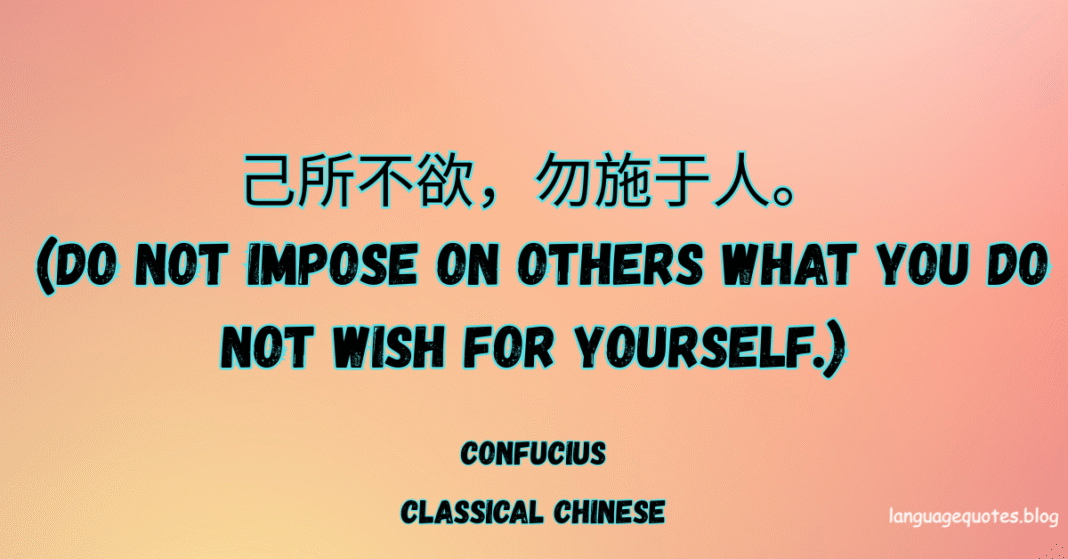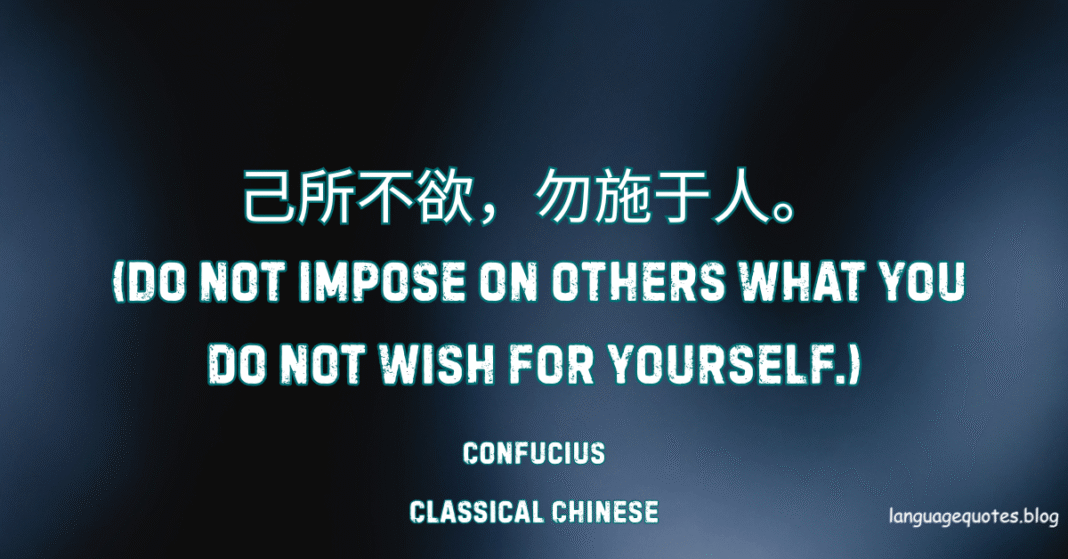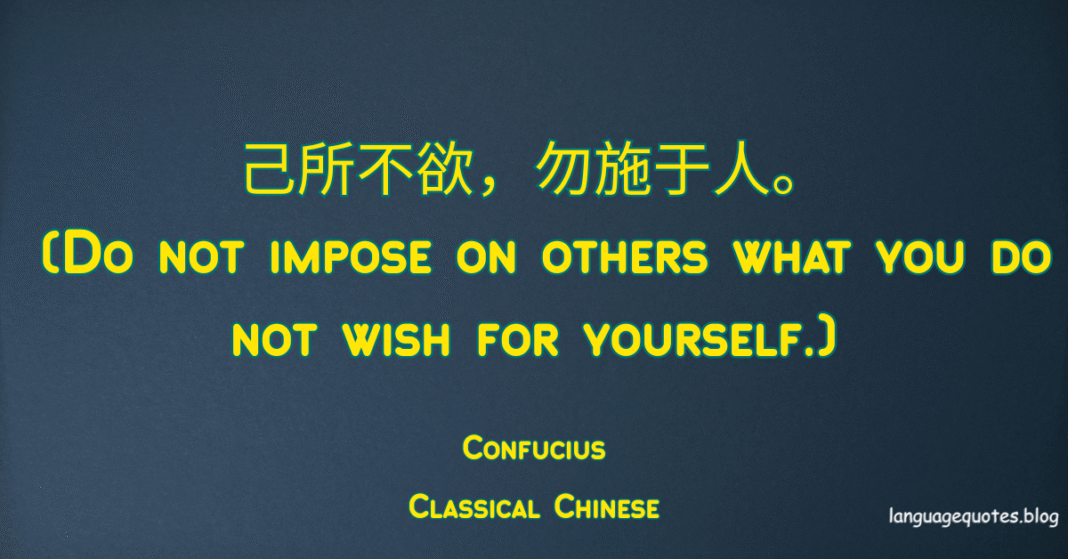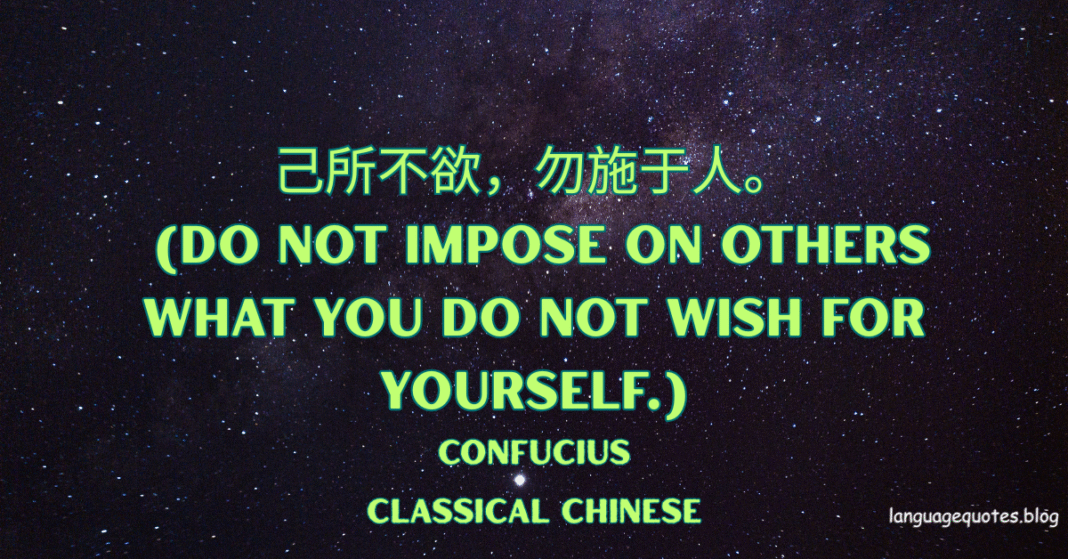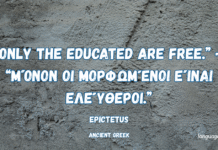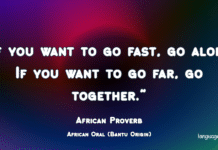“己所不欲,勿施于人。”
(“Do not impose on others what you do not wish for yourself.”)
💬 2-Line Comment:
Confucius distills the essence of empathy in one timeless line. A moral compass for every human interaction—personal, social, and global.
🌏 Introduction: A Universal Moral Guideline
The quote “Do not impose on others what you do not wish for yourself” is one of the most enduring principles of moral philosophy and social ethics, famously attributed to Confucius, the revered Chinese philosopher whose teachings continue to shape Eastern and global thought. This simple yet profound line encapsulates the essence of empathy, respect, and reciprocal ethics. It is often considered a forerunner of the “Golden Rule” found in various religious and philosophical traditions: treat others as you wish to be treated.
What makes this quote timeless is its universal applicability. Whether in ancient China or today’s globalized world, whether in interpersonal relationships or international diplomacy, this principle holds true. It teaches that ethical behavior begins with understanding others through our own human experience—that we must consider how our actions affect others, using ourselves as the starting point for compassion.
🧠 Understanding the Meaning: Self as the Ethical Mirror
At its core, this quote is an invitation to empathy-based morality. It tells us to use our own preferences, aversions, and experiences as the basis for how we treat others. If we do not wish to be lied to, humiliated, or exploited, then we must not engage in those behaviors toward others. This approach removes the ambiguity from moral choices. It doesn’t require external rules; it asks only that we look inward, recognize our common humanity, and act accordingly.
This principle is powerful because it transcends personal bias. Rather than prescribing specific actions, it offers a method: “Take your own feelings as a guide.” By reversing roles in your mind, you step into another person’s shoes. That mental shift leads to fairness, kindness, and justice.
🧘 The Confucian Ethical Framework: Harmony Through Reciprocity
In Confucianism, the moral life is one of balance, mutual respect, and social harmony. The teachings of Confucius are not centered on laws or punishments, but on virtue and self-cultivation. This quote is part of that larger vision of ren (仁)—humaneness—and li (礼)—ritual propriety. The idea is not just to avoid harm, but to contribute to a balanced and respectful society by beginning with oneself.
Confucius believed that personal virtue leads to social order. In this worldview, the moral individual is not only self-disciplined but also attuned to others. The quote becomes a social contract, silently agreed upon between people who value peace, equity, and harmony.
🌍 Global Relevance: A Cross-Cultural Moral Compass
What’s fascinating is that the essence of this quote is mirrored in cultures and religions across the globe:
-
Christianity teaches: “Do unto others as you would have them do unto you.”
-
Islam says: “None of you truly believes until he loves for his brother what he loves for himself.”
-
Buddhism emphasizes compassion and the cessation of harm.
-
Judaism teaches: “What is hateful to you, do not do to your fellow.”
This convergence suggests that reciprocity and empathy are foundational values of humanity itself, not bound by time or tradition. Confucius simply expressed it with profound clarity.
🔄 Everyday Applications: From Home to the World Stage
This quote is more than a philosophical idea—it’s a practical guideline for daily living:
-
In relationships, it teaches us not to speak harshly, betray trust, or dismiss others’ feelings.
-
In leadership, it urges transparency, fairness, and humility—qualities every good leader should embody.
-
In education, it reminds teachers to be patient and respectful, just as they once needed while learning.
-
In business, it sets a standard for ethical dealings: don’t exploit customers, employees, or competitors.
-
On a global level, it advocates for peace and diplomacy—nations should treat others as they wish to be treated.
Following this simple rule could radically change how we conduct personal interactions, politics, and international relations. It builds the foundation for mutual respect and coexistence.
🧘♂️ Emotional and Moral Intelligence: A Self-Check
This quote also develops emotional intelligence. It encourages self-awareness, the first step to being mindful in action and speech. It makes you stop and ask:
-
Would I like to be treated this way?
-
Would I appreciate this kind of tone, decision, or behavior?
-
What would this feel like if I were on the receiving end?
Asking these questions develops moral empathy and nurtures a deep sense of accountability—not enforced by law, but by conscience.
🔁 Reversibility: The Test of Ethics
In ethical philosophy, there’s a principle called reversibility—the ability to flip a moral situation and still find it acceptable. This quote fits perfectly into that framework. If a decision or action is not reversible—meaning, if you wouldn’t want it done to you—it probably isn’t ethical.
By making this principle habitual, we become more consistent, kinder, and fairer people. It helps align our actions with universal human dignity.
📝 Conclusion: The Golden Thread of Moral Wisdom
“Do not impose on others what you do not wish for yourself.” With these few words, Confucius offers a guiding star for individual behavior and collective ethics. It calls us to look inward before acting outward, to use empathy as a moral compass, and to treat others not just with tolerance but with deep understanding.
If every person, community, and leader lived by this principle, the world would be a more peaceful, equitable, and compassionate place. This quote doesn’t just promote kindness; it demands integrity. And in doing so, it lifts us from self-interest to shared humanity.


